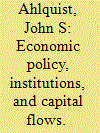| Srl | Item |
| 1 |
ID:
099295


|
|
|
|
|
| Publication |
2010.
|
| Summary/Abstract |
Encompassing labor movements and coordinated wage setting are central to the social democratic economic model that has proven successful among the nations of Western Europe. The coordination of wage bargaining across many unions and employers has been used to explain everything from inequality to unemployment. Yet there has been limited theoretical and quantitative empirical work exploring the determinants of bargaining coordination. I argue formally that more unequally distributed resources across unions should inhibit the centralization of strike powers in union federations. Using membership as a proxy for union resources, I find empirical evidence for this hypothesis in a panel of 15 OECD democracies, 1950-2000. I then show that the centralization of strike powers is a strong predictor of coordinated bargaining.
|
|
|
|
|
|
|
|
|
|
|
|
|
|
|
|
| 2 |
ID:
103306


|
|
|
|
|
| Publication |
2011.
|
| Summary/Abstract |
Developing countries vary dramatically in the amount they spend on social insurance. We establish a theoretical framework linking autarkic post-World War II economic development strategies with the emergence of insurance-based social policies. We argue that a government's choice of development strategy is conditioned by the size of the domestic market, relative abundance of labor, and land inequality in the context of a closed international trading system. The development strategy in turn shapes the fiscal priority governments place on social insurance. Contrary to the compensation hypothesis prominent in studies of the rich democracies, protectionist countries emphasize social insurance. Empirical analysis finds support for our argument. The results suggest that economic policies in the 1950s, 1960s, and 1970s had important implications for the emergence and current contours of social policy in the developing world. These differences in priorities swamp recent within-country changes.
|
|
|
|
|
|
|
|
|
|
|
|
|
|
|
|
| 3 |
ID:
073554


|
|
|
|
|
| Publication |
2006.
|
| Summary/Abstract |
Scholars examining the cross-national mobility of capital have followed two distinct paths. Economists tend to focus on the determinants and economic effects of cross-country capital movements while political scientists largely concentrate on the political impact of capital mobility. This study fills an important gap in the literature by examining the effects of economic policy outcomes on capital inflows to developing countries, explicitly comparing the reactions of portfolio and direct investors. I find that portfolio investors are in fact sensitive to past government behavior and fiscal policy outcomes; portfolio investors reallocate funds as new information about government policy becomes available. Direct investors, on the other hand, are not sensitive to macrolevel economic policy outcomes but are concerned with political institutions. Countries with more stable and democratic political institutions attract more FDI. These findings have implications for developing country governments as they consider the sequence of market liberalizing reforms.
|
|
|
|
|
|
|
|
|
|
|
|
|
|
|
|
| 4 |
ID:
131485


|
|
|
|
|
| Publication |
2014.
|
| Summary/Abstract |
If any group of American blue-collar workers has benefited from the growth of trade it is the unionized dockworkers along the US West Coast. Nevertheless, the International Longshore and Warehouse Union (ILWU) representing these workers is vocally opposed to trade liberalization. We examine several competing explanations for this puzzle and evaluate them by tracing the union's stance on trade over several decades. We also use an original survey to compare ILWU affiliates' attitudes on trade with those of nonmembers with otherwise similar characteristics. Consistent with a model of organizational socialization, the data support the hypothesis that ILWU membership affects the members' revealed political opinions; the data are difficult to reconcile with standard theories of international trade. Our findings indicate that the political support for trade depends not just on voters' structural positions in the economy but also on the organizations and networks in which they are embedded.
|
|
|
|
|
|
|
|
|
|
|
|
|
|
|
|
| 5 |
ID:
155595


|
|
|
|
|
| Summary/Abstract |
Several recent studies link rising income inequality in the United States to the global financial crisis, arguing that US politicians did not respond to growing inequality with fiscal redistribution. Instead, Americans saved less and borrowed more to maintain relative consumption in the face of widening economic disparities. This article proposes a theory in which fiscal redistribution dampens the willingness of citizens to borrow to fund current consumption. A key implication is that pretax inequality will be more tightly linked with credit in less redistributive countries. The long-run partisan composition of government is, in turn, a key determinant of redistributive effort. Examining a panel of eighteen OECD democracies, the authors find that countries with limited histories of left-wing participation in government are significantly more likely see credit expansion as prefisc inequality grows compared to those in which the political left has been more influential.
|
|
|
|
|
|
|
|
|
|
|
|
|
|
|
|